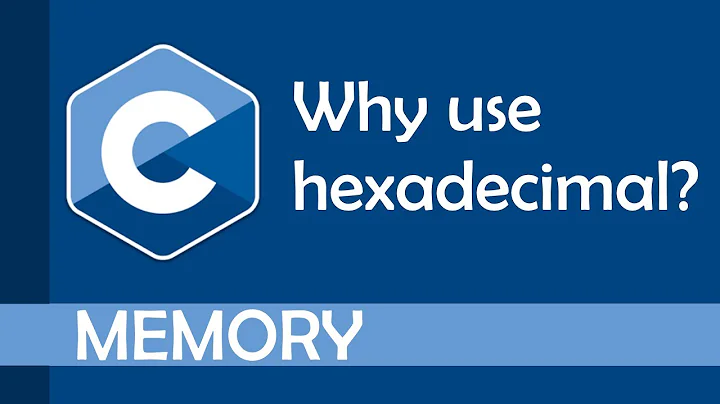When should I use double instead of decimal?
Solution 1
I think you've summarised the advantages quite well. You are however missing one point. The decimal type is only more accurate at representing base 10 numbers (e.g. those used in currency/financial calculations). In general, the double type is going to offer at least as great precision (someone correct me if I'm wrong) and definitely greater speed for arbitrary real numbers. The simple conclusion is: when considering which to use, always use double unless you need the base 10 accuracy that decimal offers.
Edit:
Regarding your additional question about the decrease in accuracy of floating-point numbers after operations, this is a slightly more subtle issue. Indeed, precision (I use the term interchangeably for accuracy here) will steadily decrease after each operation is performed. This is due to two reasons:
- the fact that certain numbers (most obviously decimals) can't be truly represented in floating point form
- rounding errors occur, just as if you were doing the calculation by hand. It depends greatly on the context (how many operations you're performing) whether these errors are significant enough to warrant much thought however.
In all cases, if you want to compare two floating-point numbers that should in theory be equivalent (but were arrived at using different calculations), you need to allow a certain degree of tolerance (how much varies, but is typically very small).
For a more detailed overview of the particular cases where errors in accuracies can be introduced, see the Accuracy section of the Wikipedia article. Finally, if you want a seriously in-depth (and mathematical) discussion of floating-point numbers/operations at machine level, try reading the oft-quoted article What Every Computer Scientist Should Know About Floating-Point Arithmetic.
Solution 2
You seem spot on with the benefits of using a floating point type. I tend to design for decimals in all cases, and rely on a profiler to let me know if operations on decimal is causing bottlenecks or slow-downs. In those cases, I will "down cast" to double or float, but only do it internally, and carefully try to manage precision loss by limiting the number of significant digits in the mathematical operation being performed.
In general, if your value is transient (not reused), you're safe to use a floating point type. The real problem with floating point types is the following three scenarios.
- You are aggregating floating point values (in which case the precision errors compound)
- You build values based on the floating point value (for example in a recursive algorithm)
- You are doing math with a very wide number of significant digits (for example,
123456789.1 * .000000000000000987654321)
EDIT
According to the reference documentation on C# decimals:
The decimal keyword denotes a 128-bit data type. Compared to floating-point types, the decimal type has a greater precision and a smaller range, which makes it suitable for financial and monetary calculations.
So to clarify my above statement:
I tend to design for decimals in all cases, and rely on a profiler to let me know if operations on decimal is causing bottlenecks or slow-downs.
I have only ever worked in industries where decimals are favorable. If you're working on phsyics or graphics engines, it's probably much more beneficial to design for a floating point type (float or double).
Decimal is not infinitely precise (it is impossible to represent infinite precision for non-integral in a primitive data type), but it is far more precise than double:
- decimal = 28-29 significant digits
- double = 15-16 significant digits
- float = 7 significant digits
EDIT 2
In response to Konrad Rudolph's comment, item # 1 (above) is definitely correct. Aggregation of imprecision does indeed compound. See the below code for an example:
private const float THREE_FIFTHS = 3f / 5f;
private const int ONE_MILLION = 1000000;
public static void Main(string[] args)
{
Console.WriteLine("Three Fifths: {0}", THREE_FIFTHS.ToString("F10"));
float asSingle = 0f;
double asDouble = 0d;
decimal asDecimal = 0M;
for (int i = 0; i < ONE_MILLION; i++)
{
asSingle += THREE_FIFTHS;
asDouble += THREE_FIFTHS;
asDecimal += (decimal) THREE_FIFTHS;
}
Console.WriteLine("Six Hundred Thousand: {0:F10}", THREE_FIFTHS * ONE_MILLION);
Console.WriteLine("Single: {0}", asSingle.ToString("F10"));
Console.WriteLine("Double: {0}", asDouble.ToString("F10"));
Console.WriteLine("Decimal: {0}", asDecimal.ToString("F10"));
Console.ReadLine();
}
This outputs the following:
Three Fifths: 0.6000000000
Six Hundred Thousand: 600000.0000000000
Single: 599093.4000000000
Double: 599999.9999886850
Decimal: 600000.0000000000
As you can see, even though we are adding from the same source constant, the results of the double is less precise (although probably will round correctly), and the float is far less precise, to the point where it has been reduced to only two significant digits.
Solution 3
Use decimal for base 10 values, e.g. financial calculations, as others have suggested.
But double is generally more accurate for arbitrary calculated values.
For example if you want to calculate the weight of each line in a portfolio, use double as the result will more nearly add up to 100%.
In the following example, doubleResult is closer to 1 than decimalResult:
// Add one third + one third + one third with decimal
decimal decimalValue = 1M / 3M;
decimal decimalResult = decimalValue + decimalValue + decimalValue;
// Add one third + one third + one third with double
double doubleValue = 1D / 3D;
double doubleResult = doubleValue + doubleValue + doubleValue;
So again taking the example of a portfolio:
The market value of each line in the portfolio is a monetary value and would probably be best represented as decimal.
The weight of each line in the portfolio (= Market Value / SUM(Market Value)) is usually better represented as double.
Solution 4
Use a double or a float when you don't need precision, for example, in a platformer game I wrote, I used a float to store the player velocities. Obviously I don't need super precision here because I eventually round to an Int for drawing on the screen.
Solution 5
In some Accounting, consider the possibility of using integral types instead or in conjunction. For example, let say that the rules you operate under require every calculation result carry forward with at least 6 decimal places and the final result will be rounded to the nearest penny.
A calculation of 1/6th of $100 yields $16.66666666666666..., so the value carried forth in a worksheet will be $16.666667. Both double and decimal should yield that result accurately to 6 decimal places. However, we can avoid any cumulative error by carrying the result forward as an integer 16666667. Each subsequent calculation can be made with the same precision and carried forward similarly. Continuing the example, I calculate Texas sales tax on that amount (16666667 * .0825 = 1375000). Adding the two (it's a short worksheet) 1666667 + 1375000 = 18041667. Moving the decimal point back in gives us 18.041667, or $18.04.
While this short example wouldn't yield a cumulative error using double or decimal, it's fairly easy to show cases where simply calculating the double or decimal and carrying forward would accumulate significant error. If the rules you operate under require a limited number of decimal places, storing each value as an integer by multiplying by 10^(required # of decimal place), and then dividing by 10^(required # of decimal places) to get the actual value will avoid any cumulative error.
In situations where fractions of pennies do not occur (for example, a vending machine), there is no reason to use non-integral types at all. Simply think of it as counting pennies, not dollars. I have seen code where every calculation involved only whole pennies, yet use of double led to errors! Integer only math removed the issue. So my unconventional answer is, when possible, forgo both double and decimal.
Related videos on Youtube
Jamie Ide
Updated on November 06, 2021Comments
-
 Jamie Ide over 2 years
Jamie Ide over 2 yearsI can name three advantages to using
double(orfloat) instead ofdecimal:- Uses less memory.
- Faster because floating point math operations are natively supported by processors.
- Can represent a larger range of numbers.
But these advantages seem to apply only to calculation intensive operations, such as those found in modeling software. Of course, doubles should not be used when precision is required, such as financial calculations. So are there any practical reasons to ever choose
double(orfloat) instead ofdecimalin "normal" applications?Edited to add: Thanks for all the great responses, I learned from them.
One further question: A few people made the point that doubles can more precisely represent real numbers. When declared I would think that they usually more accurately represent them as well. But is it a true statement that the accuracy may decrease (sometimes significantly) when floating point operations are performed?
-
Ian Ringrose about 14 years
-
 Jamie Ide over 9 yearsThis gets upvoted pretty regularly and I still struggle with it. For example, I'm working on an application that does financial calculations so I'm using decimal throughout. But the Math and VisualBasic.Financial functions use double so there's a lot of converting which has me constantly second guessing the use of decimal.
Jamie Ide over 9 yearsThis gets upvoted pretty regularly and I still struggle with it. For example, I'm working on an application that does financial calculations so I'm using decimal throughout. But the Math and VisualBasic.Financial functions use double so there's a lot of converting which has me constantly second guessing the use of decimal. -
Chris Marisic about 9 years@JamieIde that's crazy the Financial functions use double, money should always be in decimal.
-
Elisabeth almost 8 years@ChrisMarisic But what can jamie Ide do working with legacy crap using double? Then you should use double too else the many conversions will cause rounding errors... no wonders he mentioned VisualBasic pfffhh.....
-
Michael Freidgeim almost 7 yearsPossible duplicate of Difference between decimal, float and double in .NET?
-
Instance Hunter about 15 yearsPrecision being the ONLY advantage of decimals, this is right. You should not be asking when you should use floating point numbers over decimals. That should be your first thought. The question then is when you should use decimals (and the answer is right here... when precision matters).
-
Michael Meadows about 15 years@Daniel Straight, It's funny, but I have the opposite opinion. I think using a less precise type because of its performance characteristics amounts to a preoptimization. You will potentially have to pay for that preoptimization many times over before you realize its benefit.
-
Instance Hunter about 15 years@Michael Meadows, I can understand this argument. Something to note though is that one of the main complaints with premature optimization is that programmers don't tend to know what's going to be slow. We know without any doubt, though, that decimals are slower than doubles. Nevertheless, I suppose in most cases, the performance improvement won't be noticeable to the user anyway. Of course, in most cases, the precision isn't needed either. Heh.
-
David Thornley about 15 yearsDecimal numbers aren't more correct, except in certain limited cases that are sometimes (by no means always) important.
-
David Thornley about 15 yearsDecimal numbers are estimates, too. They conform to the conventions of financial arithmetic, but there's no advantage in, say, calculations involving physics.
-
Mark Cidade about 15 yearsCan you provide an examp,e of a base 10 number with which precision is lost when converting to base 2?
-
Noldorin about 15 years@Mark: 1.000001 is one example, at least according to Jon Skeet. (See question 3 of this page: yoda.arachsys.com/csharp/teasers-answers.html)
-
Konrad Rudolph about 15 yearsPoint 1 is incorrect. Precision/rounding errors only occur in casting, not in calculations. It is of course correct that most mathematical operations are unstable, thus multiplying the error. But this is another issue and it applies the same for all data types of limited precision, so in particular for decimal.
-
Konrad Rudolph about 15 years@Mark: very simple example: 0.1 is a periodic fraction in base 2 so it cannot be expressed precisely in a
double. Modern computers will still print the correct value but only because they “guess” at the result – not because it really is expressed correctly. -
Michael Meadows about 15 years@Konrad Rudolph, see the example in "EDIT 2" as evidence of the point I was trying to make in item # 1. Often, this problem doesn't manifest itself because the positive imprecision balances with the negative imprecision, and they wash in the aggregate, but aggregating the same number (as I did in the example) highlights the problem.
-
 dan04 almost 14 yearsDecimal floating-point is actually LESS precise than binary floating-point using the same number of bits. Decimal's advantage is being able to exactly represent DECIMAL fractions like 0.01 which are common in financial calculation.
dan04 almost 14 yearsDecimal floating-point is actually LESS precise than binary floating-point using the same number of bits. Decimal's advantage is being able to exactly represent DECIMAL fractions like 0.01 which are common in financial calculation. -
 BlueRaja - Danny Pflughoeft almost 13 yearsWell, this is not quite correct :) - in many games floating-point numbers can be undesireable, because of the fact that they are not consistent. See here
BlueRaja - Danny Pflughoeft almost 13 yearsWell, this is not quite correct :) - in many games floating-point numbers can be undesireable, because of the fact that they are not consistent. See here -
 Machado over 12 yearsGreat example. Just shown it to my junior developers, the kids were amazed.
Machado over 12 yearsGreat example. Just shown it to my junior developers, the kids were amazed. -
supercat over 10 yearsThe
Decimaltype has 93-bits of precision in the mantissa, compared with about 52 fordouble. I wish Microsoft supported the IEEE 80-bit format, though, even if it had to be padded out to 16 bytes; it would have allowed a larger range thandoubleorDecimal, much better speed thanDecimal, support for transcendental operations (e.g. sin(x), log(x), etc.), and precision which while not quite as good asDecimalwould be way better thandouble. -
gnasher729 about 9 yearsNow can you do the same thing with 2/3rds instead of 3/5ths... You should learn about the sexagesimal number system which handles 2/3rds perfectly fine.
-
jhenninger almost 9 years@gnasher729, using 2/3rds instead of 3/5ths was not handled perfectly fine for the different types. Interestingly, the float value yielded
Single: 667660.400000000000while the decimal value yieldedDecimal: 666666.7000000000. The float value is a little less than one thousand over the correct value. -
Noldorin almost 9 years@charlotte: If you read my full post, you'll see that's explained.









